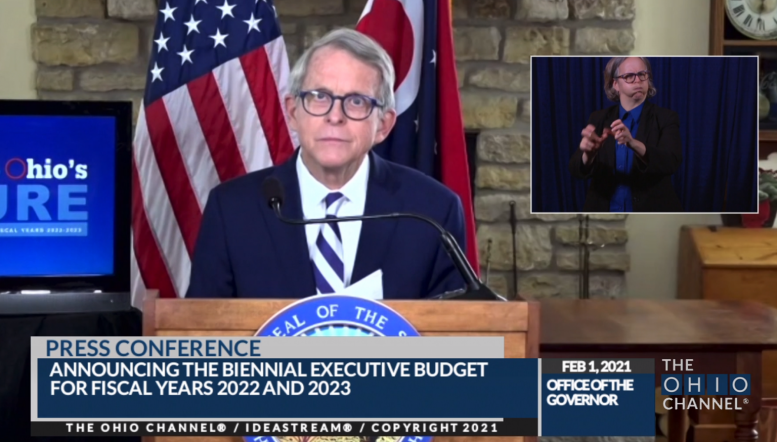Ohio Capital Journal
The Ohio Department of Health recontoured its COVID-19 vaccine lottery program, requiring inoculated Ohioans to register for entry in the $1 million sweepstakes instead of being automatically entered by virtue of voter registration and vaccination.
The change is likely to whittle down the number of entrants, thus increasing the odds of winning one of five drawings starting the week of May 24. Health officials said Monday they made the changes to enable a vaccination verification system.
ODH Director Stephanie McCloud, speaking to reporters, declined to quantify exactly how much she hopes or expects the lottery will drive up demand for vaccinations.
She said international media attention of the unorthodox effort and a social media buzz about it are evidence of early success.
“It is not a numeric goal,” she said. “As I mentioned earlier, we are already seeing the success of this program. It is to create awareness, to make sure that those individuals who may not fully understand may now have an interest in asking the questions they may have put off asking about the vaccine.”
Ohioans’ demand for vaccination has unmistakably plummeted. On March 31, more than 107,000 Ohioans received a vaccine dose against COVID-19. On April 30, fewer than 24,000 did, according to an analysis of state health department data.
All told, fewer than 43% of Ohioans have started the vaccination process, compared to the national rate of 47%.
Gov. Mike DeWine announced the vaccine lottery in a statewide briefing May 12, coupled with news of removing nearly all health orders in early June.
On Monday, he noted a modest increase in vaccine uptake May 14 as 25,000 Ohioans got their first shots, compared to about 13,000 per day on average over the preceding week. He cited this as early evidence of success of the lottery in incentivizing vaccination.
However, on May 10, federal officials greenlit use of the Pfizer-BioNTech vaccine on children aged 12-15, possibly contributing to some of the uptick. The CDC and DeWineadministration formally updated their guidance May 12.
A health department spokeswoman declined a request for vaccine data among children aged 12-15.
As further evidence, DeWine said uptake among adults aged 30-74 increased slightly last week after two weeks of decline in the cohort.
Lottery details
At the briefing Monday, officials with the state lottery and state health department provided further details about the lotteries.
Alongside the $1 million drawings, vaccinated Ohioans aged 12-17 can enter to win one of five full-ride scholarships (including room, board, tuition and books) to any Ohio state college or university.
Ohioans can enter the lottery pool by visiting www.ohiovaxamillion.com or by calling 1-833-427-5634. Entrances will be carried over through all five drawings. State officials say they will remove all duplicate entries and verify vaccination records for all winners.
To be eligible, a winner must be a U.S. citizen and Ohio resident; not be incarcerated for a felony conviction; not be an employee of ODH, the governor, or the state lottery; not be both a blood relative or spouse and a household member of an employee of ODH, the governor or the lottery; and must have received at least the first dose of a Pfizer-BioNTech, Moderna or Johnson & Johnson COVID-19 vaccine.
ODH is using federal stimulus funds to pay out on winnings. The first winners will be announced at 7:29 p.m. May 26. Subsequent announcements are set to occur each of the next four Wednesdays.
Read details on the lottery from ODH here.
***
Also from Ohio Capital Journal:
Turning the page: After 15 months Ohio starts to move on from pandemic
With a surplus of coronavirus vaccines and dropping case numbers, Gov. Mike DeWine on Monday indicated that Ohio is starting to return to normal.
The U.S. Centers for Disease Control and Prevention last week abruptly reversed its guidance, saying that Americans who had been vaccinated could go without masks — including indoors. DeWine followed suit on Monday, lifting mask requirements except in nursing homes, schools, medical facilities and on public transportation.
It will be up to businesses to decide whether to require masks, DeWine said.
The governor will lift all pandemic health orders on June 2. After that, Ohioans who refuse the vaccine and to take other precautions will in many ways be on their own.
“Those individuals who are not vaccinated will be taking a very significant risk,” DeWine said, later adding, “It’s time to transfer responsibility over to individuals and let them make their own decisions.” READ MORE
Ohio creates new program to fund broadband internet expansion projects
A student being able to finish a school project at home with the help of online research.
A farmer selling goods using an online marketplace. A busy parent receiving telehealth services from their own living room.
An estimated 1 million Ohioans lack access to high-speed internet at home. These are the types of opportunities a new program meant to spur broadband expansion projects around the state may provide in the coming years.
Gov. Mike DeWine signed House Bill 2 into law on Monday, which creates the Ohio Residential Broadband Expansion Grant Program.
This has been a bipartisan goal at the Ohio Statehouse for a number of years, particularly among those lawmakers who represent more rural areas of the state.
The bill allocates an initial $20 million to fund broadband infrastructure projects. There is expected to be more funding toward this purpose included in the biennial budget currently being negotiated. READ MORE
Bipartisan bill looks to make state Board of Ed entirely elected
Two Ohio state representatives want to reduce the size of the state Board of Education, and eliminate governor-appointed spots.
The Board of Education currently has 19 members, 11 of which are elected. In a bill introduced Friday by state Reps. Adam Bird, R-New Richmond and Joe Miller, D-Amherst, all would be elected.
The board, which oversees statewide educational issues, including budgets and curriculums, and the bill sponsors say more transparency and accountability is needed for the group.
“Right now, 42% of the members of the State Board of Education are not elected and therefore are not accountable to anyone,” Bird said in a statement.
Miller said changing the make-up of the body “will return the original intent and give taxpayers a voice on issues and policies that will affect their children’s education.” READ MORE





